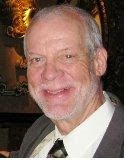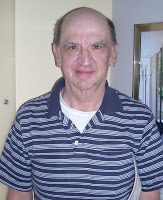memorandum, dated May 25, 1998, which I delivered to The Rev. Jamie
Rasmussen, then-pastor at Grace Community Church in Detroit, Michigan, after
listening to a tape of a sermon he delivered titled, “What Would Jesus Say
to Ellen DeGeneres”. This was
shortly after Ellen came out on her TV show.]
exchange names, we met this past Friday when I came into Grace Community Church
to buy a tape of your sermon titled “What
Would Jesus Say to Ellen DeGeneres?”.
You were surprisingly young and full of sunny energy as we passed in the
office doorway. You asked me what tape I
wanted. I told you and you said that you
had given that sermon and told me to let you know what I thought of it. I thanked you and went on my way, tape in
hand.
tape three times now and would be happy to share my thoughts with you. Let me begin by saying that I am a gay man of
52 who has been in a monogamous marriage for 25 years. I have two adult children and a very
comfortable life, at least on the surface.
The fact is that my wife and I have decided to begin a gradual separation
process because I have come, finally and almost inevitably, to the conclusion
that I can no longer feel happy and fulfilled living without the love of
another man. For most of my adult life,
I bought the popular myth–as I believe you have–that homosexuality was a
“lifestyle” which involved choosing whether I would engage in sex
with a woman (my wife) in the context of a loving, caring relationship, or with
a series of men, always without real human connection and love. Placed in this context, the choice seemed
rather simple. After all, weren’t these
urges I felt merely lust, a desire for a quick fix of heated passion followed
by days and weeks–even months–of desolation, guilt, and shame?
believe it, let me tell you that no heterosexual can possibly understand the
torment that came from trying to live my life ever faithful to what society
expected of me and in complete sublimation of my truest inner nature. I felt like the Ugly Duckling who never, ever
sees a swan but always thinks of himself as different, degenerate, inherently
unlovable. Over the course of the past
half-dozen years, I have been gradually emerging from my cocoon of self-hatred
into the light. I have discussed my
orientation with counselors, friends, clergy, family, and co-workers. I have become active in the politics of
gender identity and sexual orientation. I
learned that my own internalized homophobia can be overcome and that I, too,
sometimes misjudge people by stereotyping them as “homophobic”. My wife and kids know that I am gay and love
me just the same. (I told my wife even
before we were married that I was attracted to men.)
WAS NEVER CONFUSED ABOUT MY SEXUAL ORIENTATION–at least since the age of
13–but only terrified of being discovered.
In your sermon, you keep referring to gays and lesbians as
“confused”. They aren’t the
ones who are confused. It’s you and
people like you who are confused–confused about what it means to be a
homosexual. You seem to feel, if I interpret
your words correctly, that gays and lesbians are “OK”–that is,
worthy of “unconditional love”–as long as they don’t act on their
feelings of attraction. Can you imagine
someone saying to a heterosexual, “I love you as a person but I hate it when
you act on your feelings of attraction to a person of the opposite
sex”? What you are asking of gay
men and lesbians is to do one of two things:
1) get married to a person who may or may not know what they are getting
into and live a false existence for as long as the marriage lasts; or 2) remain
celibate (and, therefore, essentially loveless) for life. What a choice! Both essentially deprive a person of the
greatest joys of human existence while condemning them to countless hours of
pain and self-recrimination!
“unconditional love”–loving the “sinner” but hating the
“sin”–is pretty cheap! We
know that Jesus loved the thieves who died with him on the cross, as well as
the men who caused his death. He forgave
them and welcomed them into the Kingdom of Heaven. Are we to believe that a lesbian or gay man
who commits an act of love with another human being, regardless of gender, is
less worthy of acceptance than these are?
The Jesus I know is SILENT about homosexuality. How do you presume to speak for Jesus when he
himself was silent? He did say that the
greatest commandments are these: to love
God with all my heart, mind, and soul and to love my neighbor as myself. Is it possible that he thought of all
people–straight or gay–as “neighbors”?
homosexuality as “sin”, I rely on John Boswell’s Christianity,
Social Tolerance, and Homosexuality (still in print and available at the
Grosse Pointe Public Library and at Barnes & Noble). On pages 100 thru 114, he addresses all three
scriptures you cite in your talk, going back to the original language for
contextual meaning. He concludes, with
regard to the citation from Leviticus,
that the Hebrew word “toevah”,
there translated as “abomination”, as in “Thou shall not lie with
mankind, as with womankind: it is an
abomination”, does not usually signify something intrinsically evil but
something ritually unclean for Jews, like eating pork or engaging in
intercourse during menstruation. Boswell
points out that the word “toevah”
is used throughout the Old Testament
to designate those Jewish sins that involve ethnic contamination, as in the
stock phrase “toevah ha-goyim”,
meaning “the uncleanness of the Gentiles”. Such an interpretation would have no
significance for Christians.
the persons Paul condemns are manifestly not homosexual. He is speaking of homosexual acts committed
by apparently heterosexual persons.
“The whole point of Romans I,
in fact, is to stigmatize persons who have rejected their calling, gotten off
the true path they were once on. What
caused the Romans to sin was not that
they lacked what Paul considered proper inclinations but that they had
them: they held the truth, but ‘in
unrighteousness’ (v. 18) because ‘they did not see fit to retain Him in their
knowledge’ (v. 28). [I]t is quite
apparent that…Paul did not discuss gay persons
but only homosexual acts committed by
heterosexual persons [emphasis in the
original].
citation from 1st Corinthians 6:9,
Boswell’s argument is purely semantic.
Of the two Greek words used in the original and now taken to indicate
that “homosexuals” will be excluded from the Kingdom of Heaven, one
applied, up until the 20th Century, to masturbation–a “sin” no
longer widely considered worthy of condemnation to Hell–and the other, best
evidence suggests, meant to Paul’s generation a “male
prostitute”. Thus, we see that upon
close examination of the cited passages, nowhere does the Bible actually
condemn homosexual acts between committed, loving, lesbians or gay men–at
least, if they are Gentiles. I encourage
you, Jamie, to study the Roswell text yourself in its entirety.
Jamie. I was ready to concede that you
really cared about gays and lesbians.
Your voice has such a compassionate ring to it. But near the end, you betray your real
feelings when you announce your opposition to the efforts of gays and lesbians
to secure the same rights to be free from discrimination that you and other
heterosexuals take for granted. You even
raise the tired, old red flag of protecting the children! What of those gay or lesbian children who may
have been in your audience? Evidence
shows that many gay boys realize their orientation by the age of 11. How would they feel about themselves after
hearing your speech? What kind of a
future can they look forward to–either devoid of intimacy or condemned by
God? Why wouldn’t suicide seem
attractive? You’re right to be concerned
for the children but the threat comes from the vibes of your own sound system,
not from some faceless gay pedophile.
been up to in the interim, it appears that my excoriating memo did nothing to
damage his career in the ministry. The
very next year, he left Detroit to lead an old, historic church in London,
Ontario, in transitioning to a “small-group-based, outreach-focused”
one, whose membership grew by 29 per cent in the two years he was there. In 2001, he left London for Chagrin Falls,
Ohio, where he pastured at the Fellowship Bible Church for six years, growing
its membership from 650 to 1400.
“Chagrin” is an apt word for my reaction upon learning that
since 2007, “Jamie”, as he prefers to be called, has been the Senior
Pastor of Scottsdale Bible Church with its 6000 adult members and 10- to 12,000
subscribers to the church’s newsletter.
He has a staff of two dozen pastors and ministers and 100
employees. Incidentally, he never
responded to my memo.]
the Author
beautiful state of Colorado out of my native Kansas by way of Michigan, the
state where I married and I came to the beautiful state of Colorado out of my
native Kansas by way of Michigan, the state where I married and had two
children while working as an engineer for the Ford Motor Company. I was married
to a wonderful woman for 26 happy years and suddenly realized that life was
passing me by. I figured that I should make a change, as our offspring were
basically on their own and I wasn’t getting any younger. Luckily, a very
attractive and personable man just happened to be crossing my path at that
time, so the change-over was both fortuitous and smooth.
retired and we moved to Denver, my husband’s home town. He passed away after 13
blissful years together in October of 2012. I am left to find a new path to
fulfillment. One possibility is through writing. Thank goodness, the SAGE
Creative Writing Group was there to light the way.



